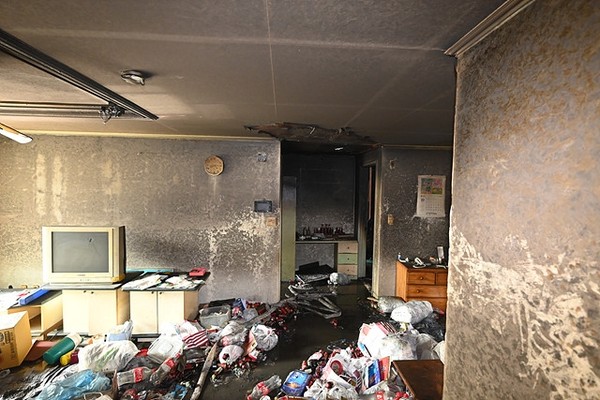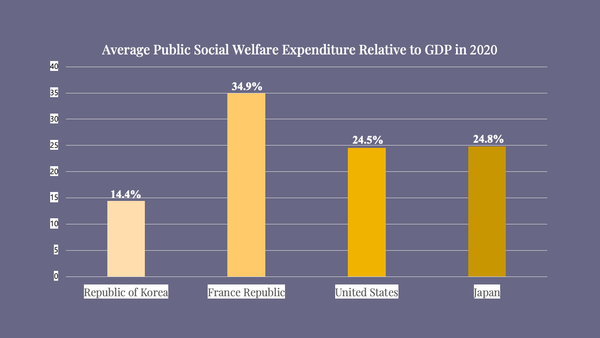
On March 11, an old mother and her son were found dead after a fire in their apartment in Gimpo, Gyeonggi. Due to the fact that the house was full of trash, the police speculated that the woman, who is thought to have died a few days before the fire, had likely starved. It indicates that the victims had suffered from social isolation. It is reported that they failed to become basic livelihood recipients because they owned some property of their own. There are still people in "welfare blind spots" who do not receive adequate welfare.

Deaths of mother and son suspected to be caused by social isolation in Gimpo
People outside the safety net
Korea is striving to ensure a minimum standard of living to protect people from various social risks based on social insurance, public assistance, and social welfare services. According to the OECD Social Expenditure Update 2023 report, it is expected that Korea's public social welfare expenditure in 2020 is 279.337 trillion won. This is about 44 trillion won higher than the previous year's expenditure of 235.925 trillion won. It has steadily increased every year since 2000 and has recorded more than 100 trillion won since 2010. This shows Korea's steady efforts to ensure the quality of life of people who can be exposed to various social risks. However, Korea's social welfare expenditure ranked 36th out of the 38 OECD countries. The average public social welfare expenditure relative to GDP in OECD countries is 23 percent, but Korea's relative to GDP in 2020 was 14.4 percent. It indicates that the size of social security, which could be considered as the evaluation component of the level of the welfare services, is lower than that of other countries. According to a report released by the Ministry of Health and Welfare on January 27, the largest portion of public social welfare spending went towards health, old age, and family, accounting for 76 percent of the total spending. Other social policy areas targeting low-income households not included in the policy accounted for 8 percent of the expenses. This is likely due to institutional limitations and the size of expenditure of policies being relatively low, resulting in welfare blind spots.
In addition to the universal welfare system such as social insurance provided to everyone, Korea is implementing public assistance that selectively provides welfare to those who have difficulty maintaining their livelihoods such as the poor, people with disabilities, and the elderly, to guarantee minimum living. This aims to integrate recipients into society and minimize poverty by providing cash benefits or in-kind salary to maintain a healthy and cultural minimum. For this purpose, Korea is currently implementing the National Basic Living Security System. It targets the absolute poor who are unable to make a living on their own and guarantees basic living standards such as livelihood, education, medical care, housing, and self-support. However, if such a social safety net is inadequate to protect people from social risks, those who are not guaranteed a minimum standard of living are neglected. This situation causes a welfare blind spot. People in this position are eventually placed in an environment where they cannot receive welfare services from the National Basic Livelihood Security System.
The limits hidden in the application process
When welfare services are not provided, anyone who has difficulty maintaining a living can apply for social security benefits. Article 21 of the National Basic Living Security Act guarantees that not only the qualified recipient but also relatives and other related persons can apply for benefits for the recipient. This recognizes the right of individuals to receive support from the state through the public assistance system. However, there is a weakness in that it is difficult to receive the benefits if the beneficiary group is not aware of the welfare system. This creates a system where individuals are responsible for accessing welfare benefits, rather than placing responsibility solely on the government to provide them. In August 2022, a mother and her two daughters, who were found dead in a multi-complex house in Suwon, died after suffering from hardships. The mother had been diagnosed with cancer, and the daughters were also suffering from incurable diseases, causing them to be unable to pay their monthly rent on time due to hospital expenses. They never applied for or consulted welfare services, even though they could have been subject to emergency living support, medical support, or housing support services at the time. This shows the limitations of the application of welfare recipients in Korea. Jeong Jae-hoon, a professor of social welfare at Seoul Women's University, said, "Korea's welfare system has not been enhanced for a long time, so there is a low level of awareness of 'welfare as a right' that individuals should receive from the government in times of crisis."1) The current welfare system in Korea makes it difficult to smoothly operate the system of voluntarily applying for welfare due to the social atmosphere in which Korea lacks recognition of welfare as a right. This reveals that Korea's welfare application system has the problem of low accessibility.
This application-based system makes recipients go through a complicated procedure to receive welfare services. In March of this year, a woman in her 80s who died after setting herself on fire while suffering from living difficulties reportedly received counseling for basic living benefits through a community center in the last year. After that, an official from the Mapo office said, "There was no additional contact since she heard that a confirmation document of the loan of use is needed during the consultation for basic living recipients."2) This document is mainly used to confirm cases where the residence of relatives or acquaintances is free of charge or provided. The woman was living with a man in his 90s in an officetel, but the man died in April last year. The officetel belonged to the man's family, but the management fee was overdue by eight months. The woman was still living in his house, but after he died, she could not receive a confirmation of the loan of use. This shows a loophole in which someone can be in a welfare blind spot due to the complicated and difficult application process even though they try to apply for the services. In this respect, this system falls short in acknowledging the individual challenges experienced by social welfare recipients. It points out the importance of the government in recognizing the limitations of the application-based system and strengthening the welfare blind spot discovery system for households in crisis.

Digging up isolated cases
The government has been implementing a welfare blind spot discovery system since 2014 to supplement the application-based process. This aids households in crisis that are expected to have difficulty in maintaining their livelihoods by obtaining information related to their diseases, debts, and employment, and by visiting them to consult or provide support. The aim is to identify people in crisis by analyzing 34 types of recipient information, which includes indicators such as electricity disconnection due to non-payment, unpaid health insurance premiums, and overdue maintenance fees. However, the incident of the sick mother and her two daughters' deaths in Suwon occurred since they were unable to receive any welfare services because of a discrepancy between their real and resident registration residences. Accordingly, the Ministry of Health and Welfare announced that it will expand the number of collected information types from 39 to 44, starting from December of this year, by adding information related to catastrophic health expenditure and suspension of debt adjustment. Through this, the government predicts that by increasing the number of information types that suggest the possibility of life difficulties, it will be able to identify and assist a wider range of households in need of welfare benefits. In this regard, Lee Bong-joo, a professor of social welfare at Seoul National University, said, "There is a fundamental limit to catching blind spots only with an arithmetic concept. We need to go out of the system and closely monitor it directly in the community."3) It means the need for an intimate discovery system with the help of local communities as well as finding blind spots only through specific arithmetic standards. In other words, it seems that not only the state and local governments, but also local communities and organizations' help is needed.
The government utilizes private organizations when it collects such information. Local governments are implementing a system to strengthen the discovery of welfare blind spots in cooperation with medical social workers, the Postal Service, neighbors, and local social security offices. Unlike the government's collection of information, they play a role in grasping the status of people in welfare blind spots based on this information. On November 24, 2022, the Ministry of Health and Welfare said it would work with telecommunications to push for a revision of the law to take over contact information if crises are detected in households. As information on the welfare blind spot increases, the government is trying to increase the accuracy of finding crisis households by attempting to cooperate with various institutions. On the other hand, the more the types of information of households in crisis, the more likely the local government social welfare official in charge of the investigation is to take over their information. Koo In-hoe, a professor of social welfare at Seoul National University, explained, "Even if 100,000 people are sent to local governments a month, it is not easy to take formal measures when there is no manpower or support conditions available on the spot, so local government officials should be able to judge for themselves and provide their own support if necessary."4) He emphasizes the need for more manpower and flexible coping skills of public officials to resolve welfare blind spots. However, on April 24 this year, the Ministry of Health and Welfare only added information on the discovery of crisis households as a follow-up to the measures of the system but did not mention the lack of manpower and work of public officials. It seems that policies on how the welfare system will provide welfare services are needed, not just focusing on the discovery alone.

Government's announcement of the discovery system for households in crisis
Protective services everywhere
Due to the lack of a safety net in society, the welfare blind spots have emerged as a serious problem today. The social atmosphere that makes it difficult to recognize welfare as a right and the complicated process of applying for them indicate the limits of the welfare services. To solve this problem, the state is collecting various types of recipient information and promoting cooperation with the private sector. These policies go beyond just finding social welfare recipients, and it seems necessary to support the manpower of social welfare officials and consider how to provide welfare services to those who need it.

Discovery of welfare blind spots in cooperation with the postal service
1) Kim Hyang-mi, "Only Available Through Application…the Welfare System Failed to Prevent Lonely Death", The Kyunghyang Shinmun, August 23, 2022
2) Kim Jung-min, "Grandmother in Her 80s Who Burned Herself to Death… No One Knew Her Hardships of Life", Joongang Ilbo, March 5, 2023
3) Choi In-young, "The Welfare Blind Spot Excavation System Was Useless for Suwon's Mother and Daughters' Incident", Yonhap News Agency, August 23, 2022
4) Kwon Ji-dam, "Plan to Find More Information on Collecting Households in Crisis but... Not Going to Increase the Number of Investigators?", The Hankyoreh, November 24, 2022


